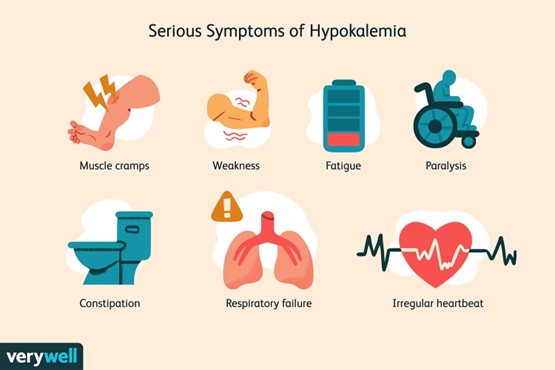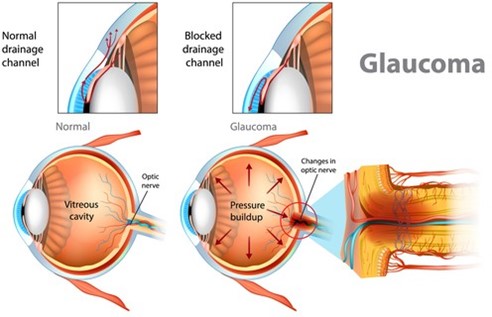A nurse in an urgent care clinic is collecting data from a client who reports having diarrhea for the past 3 days. Which of the following findings indicates hypokalemia?
Pitting edema
Diplopia
Muscle weakness
Hyperactive bowel sounds
The Correct Answer is C
A nurse collecting data from a client who reports having diarrhea for the past 3 days should identify that muscle weakness is a symptom of hypokalemia. Hypokalemia is a condition in which the blood potassium level is low and can be caused by excessive fluid loss through diarrhea. Potassium helps regulate muscle contractions, so when blood potassium levels are low, muscles may produce weaker contractions which result in muscle weakness.
The other options are not typical symptoms of hypokalemia.
a) Pitting edema is not a typical symptom of hypokalemia.
b) Diplopia is not a typical symptom of hypokalemia.
d) Hyperactive bowel sounds are not a typical symptom of hypokalemia.

Nursing Test Bank
Naxlex Comprehensive Predictor Exams
Related Questions
Correct Answer is A
Explanation
a ."I will take a stool softener to prevent constipation."
Explanation:
The statement that indicates an understanding of the instructions is "I will take a stool softener to prevent constipation."
Explanation for the other options:
b. "I will ask to work the night shift, so I will not be driving in bright sunlight."
This statement is incorrect. The need to work the night shift to avoid bright sunlight does not relate to the discharge instructions for a client postoperative following laser surgery for open-angle glaucoma. The primary focus of discharge teaching for this condition would be related to eye care, medication administration, and follow-up appointments.
c. "I will need to use my eye drops for 1 year."
This statement is incorrect. While eye drops are commonly prescribed for open-angle glaucoma, the duration of their use can vary based on the individual's condition and the healthcare provider's instructions. The client should follow the specific instructions given by their healthcare provider regarding the frequency and duration of eye drop use.
d. "I will need to follow a low-protein diet."
This statement is incorrect. A low-protein diet is not typically part of the discharge instructions for a client postoperative following laser surgery for open-angle glaucoma. The focus of dietary recommendations for open-angle glaucoma is on maintaining a healthy diet and managing other health conditions that may affect intraocular pressure, such as high blood pressure or diabetes.
In summary, the statement that demonstrates an understanding of the discharge instructions for a client postoperative following laser surgery for open-angle glaucoma is "I will take a stool softener to prevent constipation." This indicates the client's awareness of the importance of preventing constipation, which can be a side effect of some medications prescribed after surgery.

Correct Answer is A
Explanation
a. "Many people have colostomies and they live full lives."
Explanation:
The correct answer is a. "Many people have colostomies and they live full lives."
When a client expresses concerns or distress regarding their colostomy and not wanting others to see the colostomy bag, it is essential for the nurse to provide support and reassurance. Responding by acknowledging that many people live full lives with colostomies helps normalize the experience and offers hope to the client.
Option b, "Would it help to speak to someone else who has a colostomy?" may be a helpful suggestion, but it should not be the initial response. First, it is important to provide immediate reassurance and support to the client before exploring additional resources or contacts.
Option c, "Why don't you want people to see the colostomy bag?" may be seen as invasive and may put the client on the spot, potentially making them feel uncomfortable or defensive. It is important to create a safe and non-judgmental environment for the client.
Option d, "The colostomy is probably only temporary," assumes information about the client's specific situation that may not be accurate. It is important to avoid making assumptions about the duration or permanence of the colostomy unless the client has shared that information. Providing false reassurances can negatively impact the client's trust and emotional well-being.
By responding with the statement that many people live full lives with colostomies, the nurse offers support, normalizes the client's experience, and promotes a positive outlook for the client's future.
Whether you are a student looking to ace your exams or a practicing nurse seeking to enhance your expertise , our nursing education contents will empower you with the confidence and competence to make a difference in the lives of patients and become a respected leader in the healthcare field.
Visit Naxlex, invest in your future and unlock endless possibilities with our unparalleled nursing education contents today
Report Wrong Answer on the Current Question
Do you disagree with the answer? If yes, what is your expected answer? Explain.
Kindly be descriptive with the issue you are facing.
